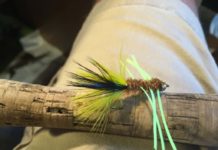The project approved last summer involves logging, prescribed burning and riparian improvements on about 66 square miles of forest.
BOISE, Idaho — Conservation groups have sued to stop a U.S. Forest Service project west of Yellowstone National Park the agency said is needed to maintain wildlife biodiversity with prescribed burning and logging.
The Alliance for the Wild Rockies and two other environmental groups said in the lawsuit filed Wednesday in U.S. District Court that the Forest Service violated environmental laws in approving the eastern Idaho project last summer.
The project involves logging, prescribed burning and riparian improvements on about 66 square miles of forest in the Caribou-Targhee National Forest in Idaho.
The project is in “the watershed for the world-famous Henry’s Fork of the Snake River, and will harm grizzly bears, and log much of the remaining old-growth forest left in the Targhee National Forest,” Mike Garrity, executive director of the Alliance for the Wild Rockies, said in a statement. “And that’s why we are taking them to court to either comply with the law or drop the project.”
The Henry’s Fork is renowned as one of the state’s best fly-fishing rivers.
The U.S. Justice Department, which defends federal agencies in lawsuits, didn’t respond to a request for comment sent through its media portal.
The Forest Service’s decision approving the project said a primary objective is to restore quaking aspen stands. The approval document said quaking aspen communities have decreased more than 40% in Idaho in the last 100 years due to fire suppression, leaving pines and other species to fill those spaces.
“Maintaining and enhancing aspen communities plays a crucial role in preserving wildlife biodiversity,” the agency said in the document. “They provide important and productive deer fawning and elk calving habitat, and lend to higher survival rate and recruitment for game species.”
The agency said replanting efforts and natural generation following logging in the 1960s to 1980s favored fast-growing lodgepole pine at the expense of aspen.
The environmental groups in the lawsuit said the Forest Service is illegally using a categorical exclusion approved under the Trump administration to approve the project. The groups said the project needs more robust environmental studies.
Specifically, the groups said the Forest Service is violating the National Environmental Policy Act as well as its own forest plan intended to guide such projects.
The groups in the lawsuit ask that a judge order the Forest Service to withdraw a finding that the project is categorically excluded from environmental laws, and stop the project until the agency complies with those laws.
Credit: Source link































